- Home
- Sherman Alexie
The Toughest Indian in the World Page 2
The Toughest Indian in the World Read online
Page 2
Waiting outside Tan Tan, he and she could smell ginger, burned rice, beer.
“Are they ever going to seat us?” she asked.
“Yeah, don’t they know who you are?”
“I hear this place discriminates against white people.”
“Really?”
“Yeah, I heard once, these lawyers, bunch of white guys in Nordstrom’s suits, had to wait, like, two hours for a table.”
“Were those billable hours?”
“It’s getting hard for a white guy to find a place to eat.”
“Damn affirmative action is what it is.”
Their first child had been an accident, the result of a broken condom and a missed birth control pill. They named her Antonya, Toni for short. The second and third children, Robert and Michael, had been on purpose, and the fourth, Ariel, came after Mary Lynn thought she could no longer get pregnant.
Toni was fourteen, immature for her age, quite beautiful and narcissistic, with her translucent skin, her long blond hair, and eight-ball eyes. Botticelli eyes, she bragged after taking an Introduction to Art class. She never bothered to tell anybody she was Indian, mostly because nobody asked.
Jeremiah was quite sure that his daughter, his Antonya, had lost her virginity to the pimply quarterback of the junior varsity football team. He found the thought of his daughter’s adolescent sexuality both curious and disturbing. Above all else, he believed that she was far too special to sleep with a cliché, let alone a junior varsity cliché.
Three months out of every year, Robert and Michael were the same age. Currently, they were both eleven. Dark-skinned, with their mother’s black hair, strong jawline, and endless nose, they looked Indian, very Indian. Robert, who had refused to be called anything other than Robert, was the smart boy, a math prodigy, while Mikey was the basketball player.
When Mary Lynn’s parents called from the reservation, they always asked after the boys, always invited the boys out for the weekend, the holidays, and the summer, and always sent the boys more elaborate gifts than they sent the two girls.
When Jeremiah had pointed out this discrepancy to Mary Lynn, she had readily agreed, but had made it clear that his parents also paid more attention to the boys. Jeremiah never mentioned it again, but had silently vowed to love the girls a little more than he loved the boys.
As if love were a thing that could be quantified, he thought.
He asked himself: What if I love the girls more because they look more like me, because they look more white than the boys?
Towheaded Ariel was two, and the clay of her personality was just beginning to harden, but she was certainly petulant and funny as hell, with the ability to sleep in sixteen-hour marathons that made her parents very nervous. She seemed to exist in her own world, enough so that she was periodically monitored for incipient autism. She treated her siblings as if they somehow bored her, and was the kind of kid who could stay alone in her crib for hours, amusing herself with all sorts of personal games and imaginary friends.
Mary Lynn insisted that her youngest daughter was going to be an artist, but Jeremiah didn’t understand the child, and despite the fact that he was her father and forty-three years older, he felt inferior to Ariel.
He wondered if his wife was ever going to leave him because he was white.
When Tan Tan’s doors swung open, laughter and smoke rolled out together.
“You got another cigarette?” he asked.
“Quit calling them cigarettes. They’re not cigarettes. They’re more like rose bushes. Hell, they’re more like the shit that rose bushes grow in.”
“You think we’re going to get a table?”
“By the time we get a table, this place is going to be very unpopular.”
“Do you want to leave?”
“Do you?”
“If you do.”
“We told the baby-sitter we’d be home by ten.”
They both wished that Toni were responsible enough to baby-sit her siblings, rather than needing to be sat along with them.
“What time is it?” she asked.
“Nine.”
“Let’s go home.”
Last Christmas, when the kids had been splayed out all over the living room, buried to their shoulders in wrapping paper and expensive toys, Mary Lynn had studied her children’s features, had recognized most of her face in her sons’ faces and very little of it in her daughters’, and had decided, quite facetiously, that the genetic score was tied.
We should have another kid, she’d said to Jeremiah, so we’ll know if this is a white family or an Indian family.
It’s a family family, he’d said, without a trace of humor.
Only a white guy would say that, she’d said.
Well, he’d said, you married a white guy.
The space between them had grown very cold at that moment, in that silence, and perhaps one or both of them might have said something truly destructive, but Ariel had started crying then, for no obvious reason, relieving both parents of the responsibility of finishing that particular conversation. During the course of their relationship, Mary Lynn and Jeremiah had often discussed race as a concept, as a foreign country they occasionally visited, or as an enemy that existed outside their house, as a destructive force they could fight against as a couple, as a family. But race was also a constant presence, a house-guest and permanent tenant who crept around all the rooms in their shared lives, opening drawers, stealing utensils and small articles of clothing, changing the temperature.
Before he’d married Mary Lynn, Jeremiah had always believed there was too much talk of race, that white people were all too willing to be racist and that brown people were just as willing and just as racist. As a rational scientist, he’d known that race was primarily a social construct, illusionary, but as the husband of an Indian woman and the father of Indian children, he’d since learned that race, whatever its construction, was real. Now, there were plenty of white people who wanted to eliminate the idea of race, to cast it aside as an unwanted invention, but it was far too late for that. If white people are the mad scientists who created race, thought Jeremiah, than we created race so we could enslave black people and kill Indians, and now race has become the Frankenstein monster that has grown beyond our control. Though he’d once been willfully blind, Jeremiah had learned how to recognize that monster in the faces of whites and Indians and in their eyes.
Long ago, Jeremiah and Mary Lynn had both decided to challenge those who stared by staring back, by flinging each other against walls and tongue-kissing with pornographic élan.
Long ago, they’d both decided to respond to any questions of why, how, what, who, or when by simply stating: Love is Love. They knew it was romantic bullshit, a simpleminded answer only satisfying for simpleminded people, but it was the best available defense.
Listen, Mary Lynn had once said to Jeremiah, asking somebody why they fall in love is like asking somebody why they believe in God.
You start asking questions like that, she had added, and you’re either going to start a war or you’re going to hear folk music.
You think too much, Jeremiah had said, rolling over and falling asleep.
Then, in the dark, as Jeremiah slept, Mary Lynn had masturbated while fantasizing about an Indian man with sundance scars on his chest.
After they left Tan Tan, they drove a sensible and indigenous Ford Taurus over the 520 bridge, back toward their house in Kirkland, a five-bedroom rancher only ten blocks away from the Microsoft campus. Mary Lynn walked to work. That made her feel privileged. She estimated there were twenty-two American Indians who had ever felt even a moment of privilege.
“We still have to eat,” she said as she drove across the bridge. She felt strange. She wondered if she was ever going to feel normal again.
“How about Taco Bell drive-thru?” he asked.
“You devil, you’re trying to get into my pants, aren’t you?”
Impulsively, he dropped his head into her lap and presse
d his lips against her black-jeaned crotch. She yelped and pushed him away. She wondered if he could smell her, if he could smell the Lummi Indian. Maybe he could, but he seemed to interpret it as something different, as something meant for him, as he pushed his head into her lap again. What was she supposed to do? She decided to laugh, so she did laugh as she pushed his face against her pubic bone. She loved the man for reasons she could not always explain. She closed her eyes, drove in that darkness, and felt dangerous.
Halfway across the bridge, Mary Lynn slammed on the brakes, not because she’d seen anything—her eyes were still closed—but because she’d felt something. The car skidded to a stop just inches from the bumper of a truck that had just missed sliding into the row of cars stopped ahead of it.
“What the hell is going on?” Jeremiah asked as he lifted his head from her lap.
“Traffic jam.”
“Jesus, we’ll never make it home by ten. We better call.”
“The cell phone is in the glove.”
Jeremiah dialed the home number but received only a busy signal.
“Toni must be talking to her boyfriend,” she said.
“I don’t like him.”
“He doesn’t like you.”
“What the hell is going on? Why aren’t we moving?”
“I don’t know. Why don’t you go check?”
Jeremiah climbed out of the car.
“I was kidding,” she said as he closed the door behind him.
He walked up to the window of the truck ahead of him.
“You know what’s going on?” Jeremiah asked the truck driver.
“Nope.”
Jeremiah walked farther down the bridge. He wondered if there was a disabled car ahead, what the radio liked to call a “blocking accident.” There was also the more serious “injury accident” and the deadly “accident with fatality involved.” He had to drive this bridge ten times a week. The commute. White men had invented the commute, had deepened its meaning, had diversified its complications, and now spent most of the time trying to shorten it, reduce it, lessen it.
In the car, Mary Lynn wondered why Jeremiah always found it necessary to insert himself into every situation. He continually moved from the passive to the active. The man was kinetic. She wondered if it was a white thing. Possibly. But more likely, it was a Jeremiah thing. She remembered Mikey’s third-grade-class’s school play, an edited version of Hamlet. Jeremiah had walked onto the stage to help his son drag the unconscious Polonius, who had merely been clubbed over the head rather than stabbed to death, from the stage. Mortally embarrassed, Mikey had cried himself to sleep that night, positive that he was going to be an elementary-school pariah, while Jeremiah vainly tried to explain to the rest of the family why he had acted so impulsively.
I was just trying to be a good father, he had said.
Mary Lynn watched Jeremiah walk farther down the bridge. He was just a shadow, a silhouette. She was slapped by the brief, irrational fear that he would never return.
Husband, come back to me, she thought, and I will confess.
Impatient drivers honked their horns. Mary Lynn joined them. She hoped Jeremiah would recognize the specific sound of their horn and return to the car.
Listen to me, listen to me, listen to me, she thought as she pounded the steering wheel.
Jeremiah heard their car horn, but only as one note in the symphony of noise playing on the bridge. He walked through that noise, through an ever-increasing amount of noise, until he pushed through a sudden crowd of people and found himself witnessing a suicide.
Illuminated by headlights, the jumper was a white woman, pretty, wearing a sundress and good shoes. Jeremiah could see that much as she stood on the bridge railing, forty feet above the cold water.
He could hear sirens approaching from both sides of the bridge, but they would never make it through the traffic in time to save this woman.
The jumper was screaming somebody’s name.
Jeremiah stepped closer, wanting to hear the name, wanting to have that information so that he could use it later. To what use, he didn’t know, but he knew that name had value, importance. That name, the owner of that name, was the reason why the jumper stood on the bridge.
“Aaron,” she said. The jumper screamed, “Aaron.”
In the car, Mary Lynn could not see either Jeremiah or the jumper, but she could see dozens of drivers leaving their cars and running ahead.
She was suddenly and impossibly sure that her husband was the reason for this commotion, this emergency. He’s dying, thought Mary Lynn, he’s dead. This is not what I wanted, she thought, this is not why I cheated on him, this is not what was supposed to happen.
As more drivers left their cars and ran ahead, Mary Lynn dialed 911 on the cell phone and received only a busy signal.
She opened her door and stepped out, placed one foot on the pavement, and stopped.
The jumper did not stop. She turned to look at the crowd watching her. She looked into the anonymous faces, into the maw, and then looked back down at the black water.
Then she jumped.
Jeremiah rushed forward, along with a few others, and peered over the edge of the bridge. One brave man leapt off the bridge in a vain rescue attempt. Jeremiah stopped a redheaded young man from jumping.
“No,” said Jeremiah. “It’s too cold. You’ll die too.”
Jeremiah stared down into the black water, looking for the woman who’d jumped and the man who’d jumped after her.
In the car, or rather with one foot still in the car and one foot placed on the pavement outside of the car, Mary Lynn wept. Oh, God, she loved him, sometimes because he was white and often despite his whiteness. In her fear, she found the one truth Sitting Bull never knew: there was at least one white man who could be trusted.
The black water was silent.
Jeremiah stared down into that silence.
“Jesus, Jesus,” said a lovely woman next to him. “Who was she? Who was she?”
“I’m never leaving,” Jeremiah said.
“What?” asked the lovely woman, quite confused.
“My wife,” said Jeremiah, strangely joyous. “I’m never leaving her.” Ever the scientist and mathematician, Jeremiah knew that his wife was a constant. In his relief, he found the one truth Shakespeare never knew: gravity is overrated.
Jeremiah looked up through the crossbeams above him, as he stared at the black sky, at the clouds that he could not see but knew were there, the invisible clouds that covered the stars. He shouted out his wife’s name, shouted it so loud that he could not speak in the morning.
In the car, Mary Lynn pounded the steering wheel. With one foot in the car and one foot out, she honked and honked the horn. She wondered if this was how the world was supposed to end, with everybody trapped on a bridge, with the black water pushing against their foundations.
Out on the bridge, four paramedics arrived far too late. Out of breath, exhausted from running across the bridge with medical gear and stretchers, the paramedics could only join the onlookers at the railing.
A boat, a small boat, a miracle, floated through the black water. They found the man, the would-be rescuer, who had jumped into the water after the young woman, but they could not find her.
Jeremiah pushed through the crowd, as he ran away from the place where the woman had jumped. Jeremiah ran across the bridge until he could see Mary Lynn. She and he loved each other across the distance.
THE TOUGHEST INDIAN IN THE WORLD
BEING A SPOKANE INDIAN, I only pick up Indian hitchhikers. I learned this particular ceremony from my father, a Coeur d’Alene, who always stopped for those twentieth-century aboriginal nomads who refused to believe the salmon were gone. I don’t know what they believed in exactly, but they wore hope like a bright shirt.
My father never taught me about hope. Instead, he continually told me that our salmon—our hope—would never come back, and though such lessons may seem cruel, I know enough to cover my hear
t in any crowd of white people.
“They’ll kill you if they get the chance,” my father said. “Love you or hate you, white people will shoot you in the heart. Even after all these years, they’ll still smell the salmon on you, the dead salmon, and that will make white people dangerous.”
All of us, Indian and white, are haunted by salmon.
When I was a boy, I leaned over the edge of one dam or another—perhaps Long Lake or Little Falls or the great gray dragon known as the Grand Coulee—and watched the ghosts of the salmon rise from the water to the sky and become constellations.
For most Indians, stars are nothing more than white tombstones scattered across a dark graveyard.
But the Indian hitchhikers my father picked up refused to admit the existence of sky, let alone the possibility that salmon might be stars. They were common people who believed only in the thumb and the foot. My father envied those simple Indian hitchhikers. He wanted to change their minds about salmon; he wanted to break open their hearts and see the future in their blood. He loved them.
In 1975 or ’76 or ’77, driving along one highway or another, my father would point out a hitchhiker standing beside the road a mile or two in the distance.
“Indian,” he said if it was an Indian, and he was never wrong, though I could never tell if the distant figure was male or female, let alone Indian or not.
If a distant figure happened to be white, my father would drive by without comment.
That was how I learned to be silent in the presence of white people.
The silence is not about hate or pain or fear. Indians just like to believe that white people will vanish, perhaps explode into smoke, if they are ignored enough times. Perhaps a thousand white families are still waiting for their sons and daughters to return home, and can’t recognize them when they float back as morning fog.
“We better stop,” my mother said from the passenger seat. She was one of those Spokane women who always wore a purple bandanna tied tightly around her head.

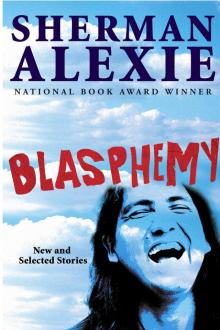 Blasphemy: New and Selected Stories
Blasphemy: New and Selected Stories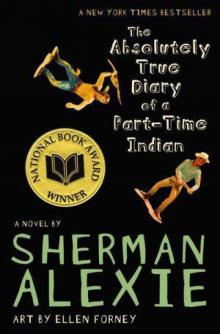 The Absolutely True Diary of a Part-Time Indian
The Absolutely True Diary of a Part-Time Indian Flight
Flight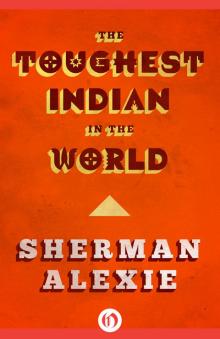 The Toughest Indian in the World: Stories
The Toughest Indian in the World: Stories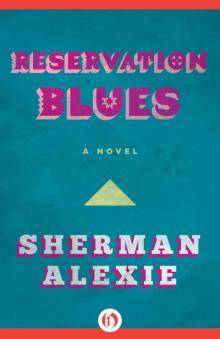 Reservation Blues
Reservation Blues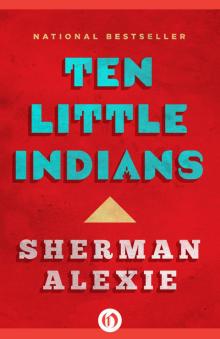 Ten Little Indians: Stories
Ten Little Indians: Stories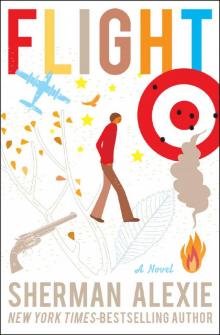 Flight: A Novel
Flight: A Novel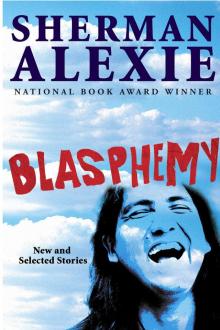 Blasphemy
Blasphemy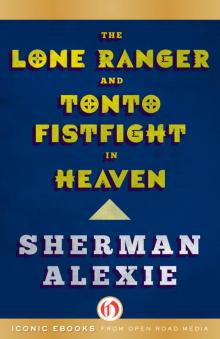 The Lone Ranger and Tonto Fistfight in Heaven
The Lone Ranger and Tonto Fistfight in Heaven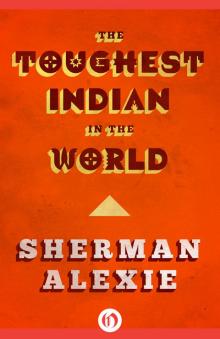 The Toughest Indian in the World
The Toughest Indian in the World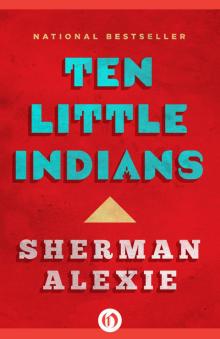 Ten Little Indians
Ten Little Indians